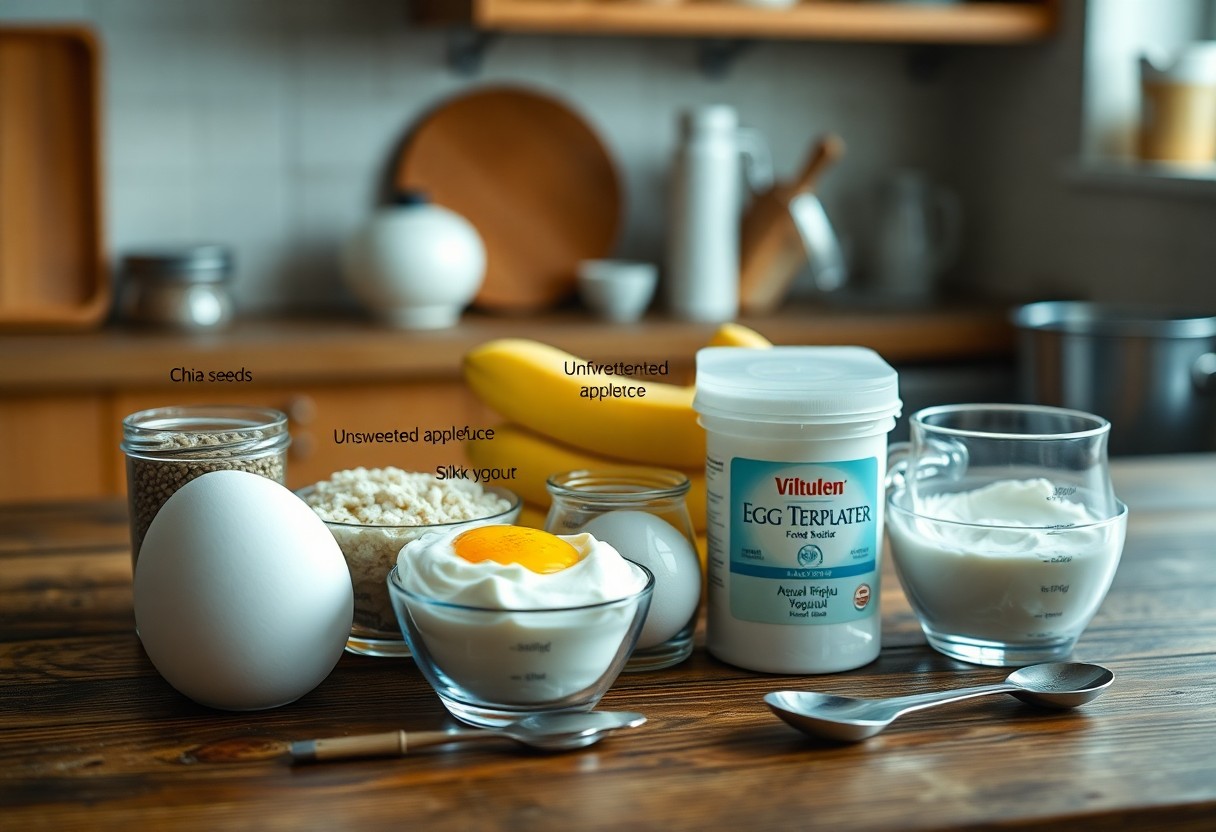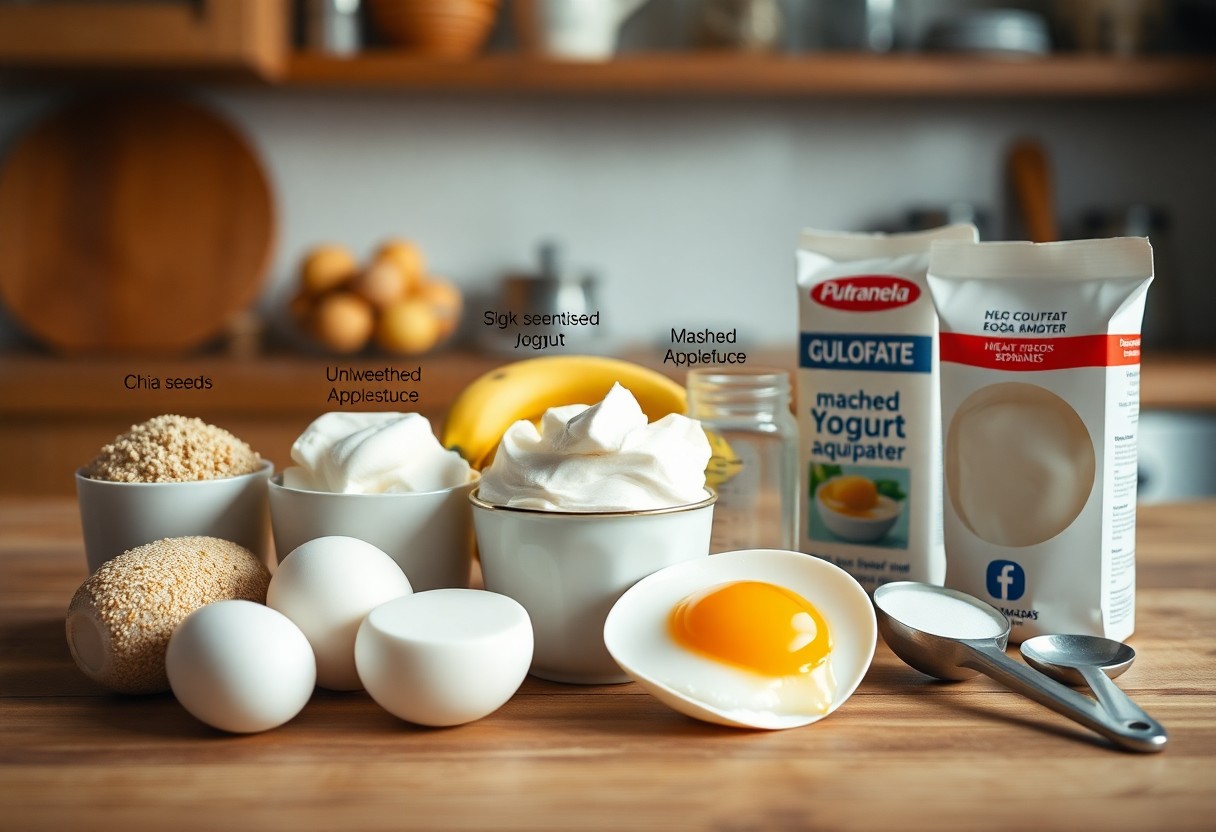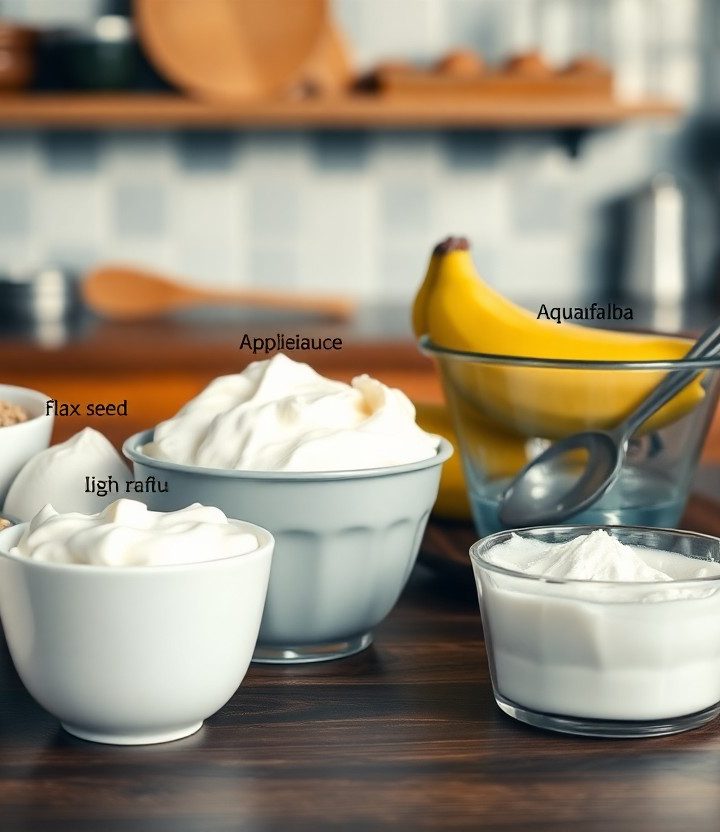You may find yourself needing to replace eggs in your recipes for various reasons, whether for healthier cooking or dietary restrictions. In this guide, I’ll share the 14 best egg substitutes that will ensure your dishes remain delicious and satisfying. Each substitute offers unique benefits, catering to both sweet and savory meals while maintaining the texture and flavor you desire. Discover how to successfully implement these alternatives in your cooking and baking, and embrace a more versatile approach to your recipes!

Key Takeaways:
- Diverse Options: There are various substitutes available for eggs in both sweet and savory dishes, catering to different dietary needs such as veganism.
- Specificity Matters: The effectiveness of an egg substitute often depends on the particular recipe, as some alternatives work better in specific contexts (e.g., aquafaba for egg whites).
- Common Ingredients: Many of the recommended substitutes, like mashed banana and yogurt, are typical pantry items, making it easy to find replacements without needing specialty products.
- Binding vs. Rising: While some substitutes (like flaxseed and chia seeds) are excellent for binding ingredients, others (like bicarbonate of soda and vinegar) help achieve rising and airy textures.
- Experimentation Encouraged: Users are encouraged to try various substitutes in their recipes to discover which combinations and alternatives work best for their tastes and desired outcomes.
Understanding the Role of Eggs in Cooking and Baking
For many recipes, eggs serve multiple purposes: they bind ingredients, add moisture, and contribute to the desired texture and flavor of dishes. I often find that eggs help create a light, airy structure in baked goods, particularly in cakes where their ability to trap air is important for a fluffy outcome. In savory dishes, eggs can enrich the flavor while enhancing the overall nutritional profile. However, if you’re vegan or simply out of eggs, knowing how to effectively substitute them is vital for achieving similar results in your cooking and baking endeavors.

Top Egg Substitutes
Your journey into healthier cooking begins with understanding the best egg substitutes. These alternatives can enhance your recipes while maintaining taste and texture, making them perfect for baking or savory dishes. Whether you’re following a vegan diet or simply running low on eggs, this guide will help you choose the right substitute for your culinary needs.
Aquafaba
Aquafaba is a remarkable egg white substitute created from the liquid in canned chickpeas. This frothy liquid works wonders when whipped, allowing you to achieve the desired light and airy texture in your dishes. As a versatile ingredient, aquafaba is perfect for meringues, mousses, and fluffy vegan desserts.
Ground Flaxseed
At the forefront of plant-based baking, ground flaxseed is a popular choice for making flax eggs. Combining one tablespoon of ground flaxseed with three tablespoons of water produces a mixture that mimics egg consistency after resting. This binding agent works well in cookies and brownies, although it may not offer the same rising power as eggs.
Substitutes like ground flaxseed provide exceptional binding properties, making them ideal for recipes that need a cohesive texture. With a nutty flavor profile, it integrates effortlessly into sweet treats while contributing omega-3 fatty acids to your baking repertoire, enhancing the nutritional value of your dishes.
Apple Purée
To add moisture and binding to your bakes, consider apple purée as an excellent substitute for eggs. This naturally sweet ingredient is made by cooking apples until soft, creating a smooth texture that complements various recipes. A quarter cup of apple purée effectively replaces one egg, perfect for cakes and muffins.
Ground techniques utilize the mild flavor of apple purée making it easy to substitute for eggs in various baking scenarios. Its moisture content helps keep baked goods tender and adds a subtle sweetness, making it suitable for dessert recipes without overpowering other flavors.
Yogurt
Behind the scenes of moist baking, yogurt provides a creamy substitute for eggs. Whether you choose coconut, soya, or Greek yogurt, this ingredient adds rich texture while binding components together. Typically, a quarter cup of yogurt will replace one egg, ideal for cakes, quick breads, and muffins.
The tanginess of yogurt not only enriches flavor but also enhances moisture levels in your recipes. Keep in mind that baked goods may require an additional few minutes in the oven to ensure they cook through, giving you that perfect rise and finish.
Mashed Banana
An easy and nutritious egg substitute, mashed banana works wonders in baked goods. Half of a banana can replace one egg, adding both moisture and natural sweetness to your recipes. It’s best suited for flavors that complement bananas, such as muffins, pancakes, and cakes.
Even though mashed banana introduces a distinct flavor profile, it also lends a delightful moist and fluffy texture to your baked goods. This option works beautifully in recipes that appreciate fruity notes, but if you’re not a fan of banana flavor, consider alternatives like pumpkin purée.
Silken Tofu
With a smooth consistency, silken tofu serves as an excellent egg replacement in both sweet and savory dishes. By puréeing a quarter cup of silken tofu, you can substitute for one egg, enhancing recipes such as cheesecakes and smoothies while offering rich creaminess.
Another benefit of silken tofu is its high protein content, making it a nutritious addition to your baking. Just be sure to blend it thoroughly to achieve a completely smooth mixture, as chunks can disrupt the texture of your final dish.
Chia Seeds
Seeds such as chia can also be transformed into a versatile binding agent for your recipes. By mixing one tablespoon of chia seeds with 2.5 tablespoons of water and letting the mixture sit, you create a gel-like substance that can effectively replace one egg.
This plant-based option is rich in fiber and omega-3 fatty acids, providing nutritional benefits while maintaining cohesion in your baked goods. Chia seeds also work wonderfully in smoothies, puddings, or as a topping for various recipes, ensuring you harness their potential in your kitchen adventures.
Coconut Oil
At the heart of many vegan recipes, coconut oil is a flavorful egg substitute that enriches batters and baked goods. Replace one egg with one tablespoon of melted coconut oil, seamlessly blending it into your mixtures for a delicious result.
This versatile oil not only adds a subtle coconut flavor but also offers healthy fats important for optimal energy levels. Use it wisely in your recipes to prevent greasiness while creating delightful, moist baked treats.
Pumpkin Purée
Now, pumpkin purée stands out as a delightful egg substitute, particularly in vegan baking. Its creamy texture, natural sweetness, and vibrant color make it perfect for cakes, cookies, and quick breads. You can buy it ready-made in a can or whip up your own at home. Just use ¼ cup of pumpkin purée to replace one egg, and enjoy the extra moisture it brings to your recipes!
Bicarbonate of Soda & Apple Cider Vinegar
Behind many light and fluffy vegan cakes lies a surprising duo: bicarbonate of soda and apple cider vinegar. This mixture triggers a chemical reaction that leavens your baked goods, resulting in a delightful airy texture. Use 1 teaspoon of bicarbonate of soda combined with 1 tablespoon of apple cider vinegar to substitute one egg, and watch your cakes rise to perfection!
Chickpea Flour
Cider lovers may be surprised to find that chickpea flour is versatile in both sweet and savory recipes. When you’re out of eggs, you can make a chickpea flour mix by combining 3 tablespoons of chickpea flour with 3 tablespoons of water to create a smooth paste. This mixture not only binds but also provides a firm texture similar to scrambled eggs. Just ensure the flour is cooked well to avoid the unpleasant raw taste!
To explore further, chickpea flour is not just an egg replacement; it can enhance your dishes with its nutritional benefits. Being high in protein and fiber, using chickpea flour can contribute to a healthier diet. Try it in pancakes, brownies, or even savory scrambles, and you’ll appreciate its subtle flavor and excellent binding properties!
Liquid Egg Substitute
An increasingly popular choice for many bakers is the liquid egg substitute. These products have evolved beyond their flavorless powder origins, offering a convenient liquid form that is easy to use. Always check the packaging for recommendations on how to enjoy them in your recipes; typically, one serving equates to one egg.
Chickpea flour also shines through in liquid egg substitutes, where you can easily find a blend that works for your baking needs. Different brands cater to various dietary preferences, so you can enjoy your favorite recipes without eggs, making these liquid alternatives a practical pantry staple.
Agar Agar
At the heart of many vegan desserts is agar agar, a plant-based gelling agent derived from seaweed. This versatile ingredient can substitute eggs for binding and thickening, though it may yield a firmer texture than traditional eggs. Use 1 tablespoon of agar agar mixed with 1 tablespoon of water to replace one egg in your recipes!
And in many baking situations, agar agar can serve as a sound alternative for those who require a vegan option for gels and puddings. While it doesn’t influence the taste much, you’ll want to experiment to find the right strength, as agar agar varies by brand. Its unique properties make it a great tool to have in your kitchen arsenal!
Arrowroot Powder
The humble arrowroot powder can be an excellent egg replacement in your baking. Derived from the roots of the arrowroot plant, it boasts thickening properties. Mix 2 tablespoons of arrowroot powder with 3 tablespoons of water to substitute for one egg, ensuring a delightful texture in your treats!
Agar flour allows for smooth and glossy results in baked goods. Besides its binding qualities, arrowroot has a neutral flavor that won’t interfere with your recipes. Feel free to experiment with it in a variety of dishes, from cookies to custards, to discover just how versatile this ingredient can be!
Choosing the Right Substitute for Your Recipe
Unlike traditional baking, selecting the right egg substitute can be a bit challenging due to the varied roles eggs play in recipes. I recommend considering the specific function you need, such as binding, rising, or moisture. For instance, aqua faba works beautifully for egg whites in meringues, while mashed banana adds flavor and sweetness in cakes. You should also note that some substitutes, like ground flaxseed, may require extra baking powder for lift. Tailoring your choice to your dish will greatly enhance your cooking and baking experience.
Tips for Successful Egg Substitution
Once again, successfully replacing eggs in your recipes can enhance both texture and flavor. Here are some tips to optimize your egg substitute experience:
- Choose the right substitute based on your dish’s requirements.
- Adjust baking times, as some substitutes may require longer cooking.
- Experiment with different combinations for the best results.
- Pay attention to the moisture levels when using purees.
After exploring these options, you might find I highly recommend checking out Egg Substitutes: 15 Alternatives for Cooking and Baking for even more insights on creative substitutions.
Common Dishes to Adapt with Egg Substitutes
All of your favorite dishes can be easily adapted using egg substitutes, allowing you to enjoy healthier versions without sacrificing taste. For baked goods like cookies, cakes, and brownies, I often opt for aquafaba or flaxseed as fantastic binding agents. When making pancakes or waffles, mashed banana adds sweetness while also replacing eggs. Even savory dishes, like scrambled eggs, can be transformed using chickpea flour for a protein-packed option. By exploring these alternatives, I ensure that my recipes not only align with my dietary needs but also taste delicious.
Summing up
The 14 best egg substitutes provide you with diverse options for your cooking and baking needs, whether you’re vegan, out of eggs, or simply seeking healthier alternatives. Each substitute offers unique benefits and works best in specific types of recipes, which allows you to maintain the desired texture and taste of your dishes. I encourage you to explore these alternatives and find the perfect fit for your recipes. For more ideas, check out 15 Best Egg Substitutes for Cooking, Baking, and More.
FAQ
Q: What are the most effective egg substitutes for baking?
A: The effectiveness of egg substitutes varies based on the recipe. Popular options include aquafaba for meringues and whipped dishes, ground flaxseed as a binding agent for cookies, and apple purée or mashed banana for added moisture in cakes. For recipes requiring leavening, a mix of bicarbonate of soda and apple cider vinegar can create a light texture.
Q: Can I use the same egg substitute for all recipes?
A: No, it’s important to choose the right substitute based on the type of dish you are preparing. For instance, silken tofu works well in rich desserts but is not suitable for light, airy cakes. Reading the recipe and understanding the function of eggs in it will help you select the appropriate substitute.
Q: How do I prepare a flax egg?
A: To make a flax egg, combine 1 tablespoon of ground flaxseed with 3 tablespoons of water. Allow the mixture to sit for about 15 minutes until it develops a gel-like consistency. This mixture can then be used as a direct substitute for one egg in most baking recipes.
Q: Is aquafaba a versatile egg substitute?
A: Yes, aquafaba, which is the liquid from canned chickpeas, is extremely versatile. It can replace egg whites in recipes that require whipping, such as meringues and mousses. Generally, 3 tablespoons of aquafaba will substitute for one egg white, making it a great option for vegan baking approaches.
Q: What is the equivalent measurement for using yogurt as an egg substitute?
A: When using yogurt as an egg substitute, you can replace one egg with ¼ cup of coconut, soya, or Greek yogurt. This not only provides binding properties but also adds moisture to your baked goods. However, be mindful that baking times may vary slightly, often requiring a longer cooking duration.
